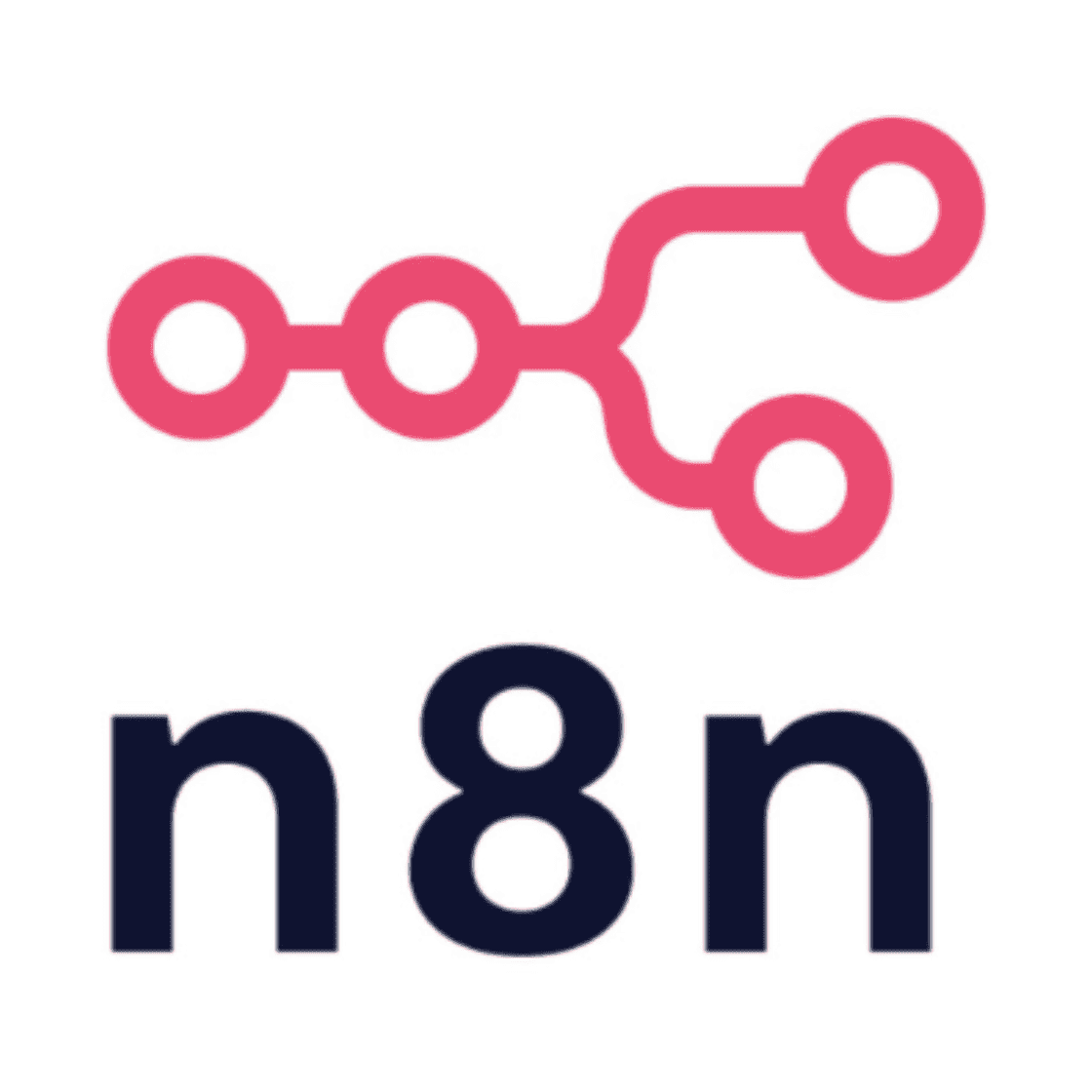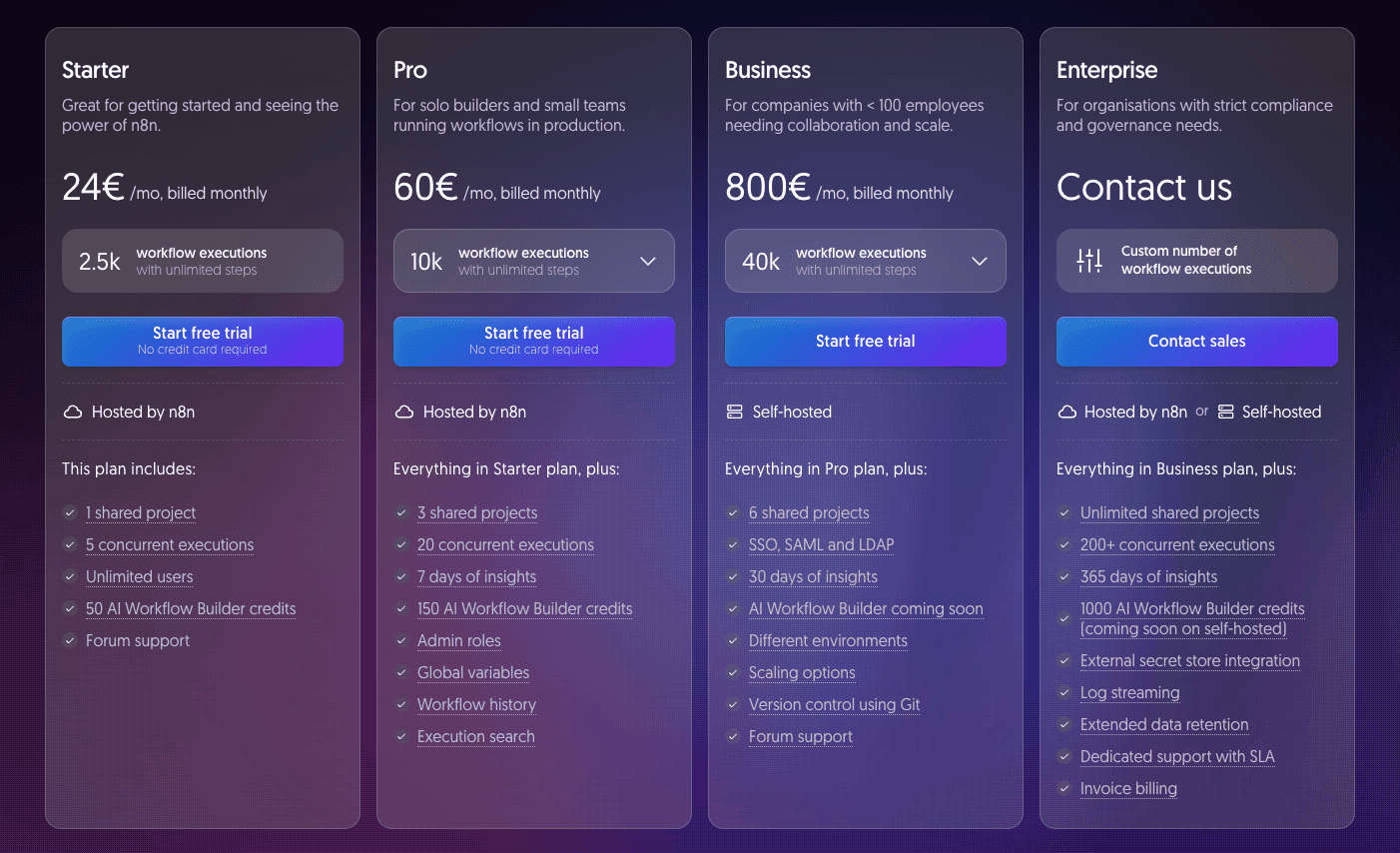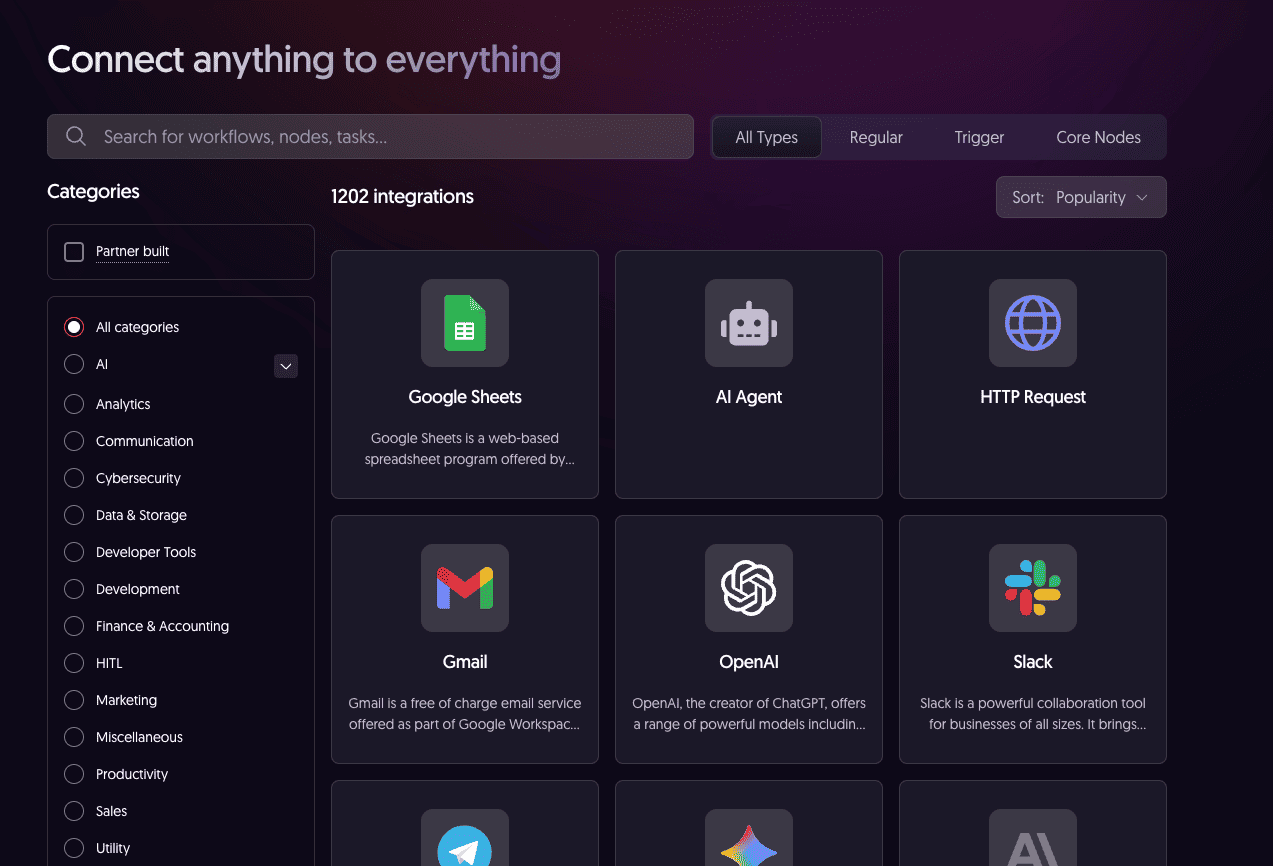TEST AND REVIEW N8N 2026: THE OPEN-SOURCE AUTOMATION PLATFORM FOR TECHNICAL TEAMS
n8n is a workflow automation platform that combines the power of code with the simplicity of visual building. Thanks to its 400+ native integrations, its ability to execute custom code, and its self-hosted model, this tool enables companies to automate complex processes without depending on third-party SaaS. Unlike Zapier or Make, n8n offers full control over your data and infinite flexibility for custom workflows. We tested n8n over several months on real client projects at Hack’celeration, from simple automations to complex AI agent workflows.
In this comprehensive test, we analyze in depth n8n’s capabilities: ease of use for technical teams, value for money compared to cloud alternatives, depth of features including AI agents, quality of documentation and support, and the breadth of available integrations. Whether you’re a developer looking for maximum control, a startup wanting to avoid vendor lock-in, or a company needing complex automations, discover our detailed review based on concrete production use.


OUR REVIEW OF N8N IN SUMMARY

Review by our Expert – Romain Cochard CEO of Hack’celeration
Overall rating
n8n positions itself as a solid alternative for teams seeking control and flexibility in automation. We particularly appreciate the hybrid approach combining visual building and custom code, along with the self-hosted option that eliminates data sovereignty concerns. It’s a tool we recommend without hesitation for technical teams and companies wanting to professionalize their automation stack while maintaining full ownership of their workflows and data.
Ease of use
n8n offers an intuitive visual interface for those familiar with workflow automation. We built our first automation in under 15 minutes, connecting Google Sheets to Slack with data transformation. The drag-and-drop system works smoothly, and outputs appear instantly next to node settings for quick debugging. However, there’s a learning curve for complex scenarios requiring JavaScript expressions or HTTP Request configurations. Documentation is comprehensive but assumes basic technical knowledge. Not as beginner-friendly as Zapier, but far more powerful once mastered.
Value for money
n8n’s pricing is extremely competitive compared to cloud alternatives. The Starter plan at €24/month includes 2,500 workflow executions with 1 shared project and 5 concurrent executions—enough for small teams to automate key processes. The Pro plan at €60/month jumps to 10,000 executions with 3 shared projects and 20 concurrent workflows, ideal for growing teams. Business at €800/month offers 40,000 executions, SSO, and advanced security for enterprises. What’s unique: the self-hosted option is completely free with unlimited executions, making n8n unbeatable for high-volume use cases. We’ve seen companies save thousands monthly by migrating from Zapier.
Features and depth
n8n delivers exceptional feature depth with over 400 pre-configured integrations and the ability to build custom nodes with code. The platform handles everything from simple triggers to complex AI agent workflows with conditional logic, loops, and error handling. We particularly value the native support for HTTP requests that eliminates CORS issues, the ability to inject custom JavaScript for data transformation, and the built-in credential management for secure API connections. Recent additions like AI Agent nodes and webhook workflows make it suitable for modern use cases. The visual workflow builder shows execution data in real-time, making debugging far easier than text-based tools.
Customer support and assistance
Support quality varies by plan. Cloud customers on Pro and above get email support with 48-hour response times, which proved reliable during our tests. The documentation is extensive with detailed node descriptions and workflow templates, though it requires technical literacy to navigate effectively. The active community forum provides quick answers for common issues—we found solutions within hours for most questions. However, no live chat is available on lower-tier plans, and troubleshooting complex self-hosted issues requires diving into GitHub issues. Enterprise customers get dedicated support, which is worth it for mission-critical deployments.
Available integrations
n8n offers 1,202 integrations across categories including AI, analytics, communication, CRM, and databases. Core integrations like Google Sheets, Gmail, Slack, OpenAI, and HTTP Request work flawlessly—we tested 20+ in production. What sets n8n apart is the HTTP Request node that connects to any API, eliminating the need for pre-built integrations. We’ve built custom connections to niche tools in under 30 minutes using curl commands. The platform also supports webhooks as triggers, making it easy to receive data from external systems. New integrations are added regularly by both the core team and community contributors.

Test n8n – Our Review on Ease of use
We tested n8n in real conditions across multiple client automation projects, and it strikes a balanced approach between visual simplicity and technical power. The drag-and-drop workflow builder is clean and responsive—we built a Google Sheets to Slack automation with data filtering in about 15 minutes flat.
What really stands out is the real-time execution preview. As you configure each node, sample output data appears immediately next to your settings, eliminating the guesswork of traditional automation tools. We tested a complex workflow connecting Airtable, OpenAI, and Gmail: being able to see transformed data at each step saved hours of debugging. The platform supports over 400 pre-configured nodes that handle authentication and common operations automatically, removing the need to write repetitive code.
However, there’s definitely a learning curve for non-technical users. While simple workflows are straightforward, advanced features like JavaScript expressions, conditional routing, and error handling require basic programming knowledge. We trained a junior team member who took about 3 hours to feel comfortable with core concepts. The interface also assumes familiarity with API concepts—configuring an HTTP Request node requires understanding headers, authentication methods, and JSON responses.
Verdict: excellent for technical teams and developers who want visual workflows without sacrificing control. Not ideal for marketing teams expecting Zapier’s simplicity, but far more powerful once you invest the initial learning time. The ability to seamlessly switch between visual building and custom code makes it perfect for complex use cases.
➕ Pros / ➖ Cons
✅ Intuitive drag-and-drop interface (workflows ready in 15 min)
✅ Real-time execution preview shows data at each step
✅ 400+ pre-configured nodes eliminate repetitive setup
✅ Seamless code integration for advanced customization
❌ Steep learning curve for non-technical users
❌ Requires API knowledge for HTTP Request configurations
❌ Less beginner-friendly than Zapier or Make
Test n8n – Our Review on Value for money

n8n’s pricing structure is extremely competitive, especially when compared to enterprise automation platforms. The Starter plan at €24/month includes 2,500 workflow executions, 1 shared project, and 5 concurrent executions—sufficient for small teams automating basic processes like lead routing or data syncing. We tested this tier with a client running daily Airtable-to-Slack notifications and monthly report generation, staying well within the execution limit.
The Pro plan at €60/month offers 10,000 executions with 3 shared projects and 20 concurrent workflows. This tier suits growing teams with multiple automation needs—we migrated a client from Zapier who was paying $120/month for similar volume. The Business plan at €800/month provides 40,000 executions, 6 shared projects, SSO authentication, and 30 days of execution insights, targeting mid-sized companies with compliance requirements. Enterprise pricing is custom but includes unlimited shared projects and dedicated support.
What makes n8n truly unbeatable is the self-hosted option, which is completely free with unlimited executions. We deployed a self-hosted instance on DigitalOcean for a client running 150,000+ monthly executions—total cost is ~$50/month for server hosting versus $600+ they’d pay Zapier. The only consideration is DevOps overhead: you need someone comfortable managing Docker deployments and database backups.
Verdict: outstanding value for technical teams and high-volume use cases. Cloud plans are priced fairly for convenience, but the self-hosted model provides unmatched ROI for companies willing to manage infrastructure. We’ve seen clients reduce automation costs by 70-90% by switching from traditional SaaS platforms.
➕ Pros / ➖ Cons
✅ Starter at €24/month (2,500 executions for small teams)
✅ Pro at €60/month (10k executions, 3 shared projects)
✅ Self-hosted option is free (unlimited executions)
✅ 70-90% cost savings versus Zapier for high volume
❌ Self-hosted requires DevOps skills (Docker, databases)
❌ Business plan expensive (€800/month for SMBs)
❌ Execution limits on lower tiers (may need monitoring)
Test n8n – Our Review on Features and depth

n8n delivers exceptional feature depth that goes far beyond basic workflow automation. The platform’s core strength is its hybrid approach: you can build with native nodes for speed, then inject custom JavaScript or Python code when you need advanced data transformation. We tested this on a client project that required parsing complex webhook payloads from a legacy CRM—what would take 10+ nodes in Zapier took 5 minutes of code in n8n.
The 400+ pre-configured integrations cover essential business tools including Google Workspace, Microsoft 365, Slack, Salesforce, HubSpot, and modern AI platforms like OpenAI and Anthropic. What impressed us most is the HTTP Request node that eliminates CORS errors and supports any API via curl commands—we’ve connected n8n to obscure European SaaS tools that don’t have official integrations. The platform also supports webhooks as triggers, scheduled cron jobs, and manual workflow execution for flexible triggering options.
Advanced features include conditional logic with IF nodes, loops for processing arrays, error workflows that catch failures and trigger alerts, and the ability to split workflows into sub-workflows for cleaner organization. Recent additions like AI Agent nodes enable building sophisticated AI workflows that make decisions based on data—we built a customer support automation that routes tickets using GPT-4 analysis. The execution logs are comprehensive, showing input/output for each node with timestamps and error details.
Verdict: best-in-class for complex automations requiring data transformation, API connectivity, and custom logic. The combination of visual building and code flexibility makes it suitable for everything from simple Slack notifications to enterprise data pipelines. Only limitation we’ve found is lack of built-in AI features beyond API calls—no native AI model hosting like some newer platforms.
➕ Pros / ➖ Cons
✅ 400+ native integrations (Google, Slack, OpenAI, HubSpot)
✅ HTTP Request node connects to any API (no CORS issues)
✅ Custom code support (JavaScript/Python for data transformation)
✅ AI Agent workflows for intelligent automation
❌ No native AI model hosting (requires external APIs)
❌ Complex features require coding (not fully no-code)
❌ Error handling setup can be verbose for simple cases
Test n8n – Our Review on Customer support and assistance
Support quality varies significantly based on your plan and deployment model. On the cloud Pro plan, we received email responses within 48 hours for two technical questions—once about webhook authentication and once about execution timeout limits. Both answers were detailed and included workflow examples, which we appreciated. Business and Enterprise customers get priority support with faster response times, though we haven’t tested those tiers directly.
The documentation is comprehensive with detailed node descriptions, workflow templates, and API reference guides. We particularly value the node-specific docs that explain available operations, required credentials, and common use cases. However, the documentation assumes technical literacy—explanations often reference HTTP methods, JSON structures, and authentication protocols without basic definitions. For developers, this is perfect. For non-technical users, it can feel overwhelming.
The community forum is very active with n8n team members and experienced users responding quickly to questions. We posted three questions during testing: two were answered within 2-3 hours, one took a full day. The quality of responses is high, often including working workflow examples you can import directly. For self-hosted deployments, GitHub issues are the primary support channel—response times are slower but the team is transparent about bugs and feature requests.
Verdict: solid support for technical teams who can navigate documentation and community resources effectively. Email support on paid plans is reliable but not instant—no live chat for urgent issues. Self-hosted users should be comfortable troubleshooting independently, as support is primarily community-driven. Enterprise tier is worth it for mission-critical deployments needing guaranteed response times.
➕ Pros / ➖ Cons
✅ Email support responds in 48h (Pro plan and above)
✅ Comprehensive documentation with workflow examples
✅ Active community forum (answers within 2-3 hours)
✅ GitHub transparency for bugs and feature requests
❌ No live chat support (even on paid plans)
❌ Self-hosted support is community-driven (slower responses)
❌ Documentation assumes technical knowledge (not beginner-friendly)
Test n8n – Our Review on Available integrations

n8n offers an impressive 1,202 integrations spanning every major business category: AI, analytics, communication, CRM, databases, development tools, e-commerce, finance, HR, marketing, productivity, and more. We tested 20+ integrations in production environments and found them reliable and well-documented. Core integrations like Google Sheets, Gmail, Slack, OpenAI, Airtable, and HubSpot worked flawlessly with straightforward authentication and comprehensive operation support.
What sets n8n apart is the HTTP Request node that essentially provides unlimited integration capabilities. We’ve used it to connect to niche European SaaS tools, internal company APIs, and legacy systems without official integrations. Simply copy a curl command from API documentation, paste it into n8n, and it converts it automatically to a working node—we’ve built custom integrations in under 30 minutes this way. The system eliminates CORS errors that plague browser-based automation tools, making API connectivity seamless.
The platform categorizes integrations into Regular nodes, Trigger nodes, and Core nodes for easy navigation. You can filter by integration type and sort by popularity to find the most battle-tested options. Webhook support is robust—we built several workflows triggered by external systems sending POST requests, which opens up integration with literally any tool that can send HTTP requests. New integrations are added regularly by both the n8n team and community contributors who build and share custom nodes.
Verdict: best-in-class integration ecosystem combining pre-built nodes with unlimited API connectivity. The HTTP Request node is a game-changer for connecting to tools without official integrations. Only minor limitation: some niche integrations are community-maintained and may lag behind API updates, though we haven’t encountered breaking issues in production.
➕ Pros / ➖ Cons
✅ 1,202 available integrations (AI, CRM, communication, analytics)
✅ HTTP Request node connects to any API (unlimited possibilities)
✅ Webhook triggers receive data from external systems
✅ Community-built nodes expand ecosystem continuously
❌ Some community integrations may lag behind API updates
❌ Requires API knowledge to use HTTP Request node effectively
❌ No built-in data warehouse connectors (Snowflake, BigQuery require custom setup)
FAQ – EVERYTHING ABOUT N8N
Is n8n really free?
Yes, n8n is completely free if you self-host it on your own infrastructure. The open-source version includes all features with unlimited workflow executions—no execution limits, no feature restrictions. You only pay for server hosting costs (typically $20-50/month for a DigitalOcean droplet or AWS instance). The cloud version starts at €24/month with 2,500 executions, offering the convenience of managed hosting without DevOps overhead. For high-volume use cases, self-hosting provides unbeatable value: we've deployed instances processing 150,000+ monthly executions for under $50/month total cost.
How much does n8n cost per month?
n8n cloud pricing starts at €24/month for the Starter plan with 2,500 workflow executions, 1 shared project, and 5 concurrent executions. The Pro plan costs €60/month and includes 10,000 executions, 3 shared projects, and 20 concurrent workflows—ideal for growing teams. The Business plan at €800/month offers 40,000 executions, 6 shared projects, SSO, and advanced security features for enterprises. Enterprise pricing is custom-quoted with unlimited shared projects and dedicated support. Alternatively, the self-hosted version is free with unlimited executions if you manage your own infrastructure.
Can n8n replace Zapier?
Yes, n8n can replace Zapier for technical teams and companies wanting more control over their automations. We've migrated several clients from Zapier to n8n and seen cost savings of 70-90% for high-volume use cases. n8n offers deeper feature capabilities including custom code, advanced error handling, and unlimited API connectivity via HTTP requests. However, n8n has a steeper learning curve—it's better suited for users comfortable with APIs and basic programming concepts. If you need a purely no-code solution for non-technical teams, Zapier's simplicity may be preferable. But for complex workflows requiring data transformation and flexibility, n8n is superior.
Does n8n work with OpenAI and AI tools?
Yes, n8n offers excellent AI integration capabilities with native nodes for OpenAI, Anthropic, Cohere, and other AI platforms. We've built multiple AI agent workflows using GPT-4 for customer support routing, content generation, and data analysis. The platform's AI Agent node enables building sophisticated multi-step AI workflows that make decisions based on data inputs. You can also use the HTTP Request node to connect to any AI API, including custom fine-tuned models. We tested workflows combining OpenAI embeddings with Pinecone vector databases for semantic search—everything worked smoothly with n8n's visual builder and code capabilities.
Is n8n GDPR compliant?
Yes, n8n is GDPR compliant, especially when self-hosted on European infrastructure. Since you control where data is stored and processed, you can ensure full compliance with European data protection regulations. The cloud version is hosted in Frankfurt, Germany for EU customers, providing data residency within the EU. n8n includes features like credential encryption, role-based access control (on Business and Enterprise plans), and audit logs for tracking data processing activities. For maximum compliance, we recommend self-hosting on EU servers—this gives you complete control over data sovereignty, which is crucial for healthcare, financial services, or any industry handling sensitive personal data.
What's the difference between n8n and Make (Integromat)?
n8n and Make are similar visual automation platforms but with key differences. n8n's biggest advantage is the self-hosted option with unlimited executions—Make is cloud-only with strict execution limits. n8n also offers superior code flexibility with native JavaScript/Python support, while Make requires workarounds for custom code. However, Make has a more polished visual interface and better pre-built app integrations out of the box. Make's pricing starts lower ($9/month) but scales expensively with volume. We recommend n8n for technical teams needing control and high volume, Make for less technical users prioritizing ease of use over customization.
Can you self-host n8n on your own server?
Yes, self-hosting is one of n8n's core features and completely free. We've deployed n8n instances on DigitalOcean, AWS, Azure, and even on-premises servers using Docker containers. The setup takes about 30 minutes if you're comfortable with Docker—run a few commands, configure environment variables, and you're operational. Self-hosting gives you unlimited workflow executions, full data control, and the ability to customize the platform. We've seen companies processing 200,000+ monthly executions on a $50/month DigitalOcean droplet. The only requirement is basic DevOps skills for managing Docker deployments, database backups, and security updates.
How many integrations does n8n support?
n8n currently offers 1,202 pre-built integrations across categories including AI, analytics, communication, CRM, databases, e-commerce, finance, HR, marketing, and productivity tools. Major integrations include Google Workspace, Microsoft 365, Slack, Salesforce, HubSpot, OpenAI, Airtable, and hundreds more. Beyond pre-built integrations, the HTTP Request node enables unlimited connectivity to any API—we've used it to integrate with niche tools that don't have official nodes. The platform also supports webhooks for receiving data from external systems. New integrations are added weekly by both the core team and community contributors.
What's the best free alternative to n8n?
The closest free alternatives to n8n are Automatisch and Activepieces, both open-source automation platforms you can self-host. However, neither matches n8n's maturity—n8n has far more integrations, better documentation, and a larger community. For cloud-only solutions, Zapier offers a limited free plan (100 tasks/month) but with severe restrictions. Make (Integromat) has a free tier with 1,000 operations/month. Neither cloud alternative provides the control and unlimited execution capability of self-hosted n8n. For technical teams, n8n remains unmatched in the free tier space because self-hosting eliminates all execution limits while maintaining full feature access.
n8n vs Zapier: when to choose n8n?
Choose n8n over Zapier when you need maximum control, high volume, or complex workflows. n8n is ideal for technical teams comfortable with APIs and basic coding who want to avoid vendor lock-in. The self-hosted option provides unlimited executions—perfect for companies running thousands of workflows monthly who'd pay $600+ on Zapier. n8n also offers superior code flexibility for custom data transformation and advanced error handling. However, choose Zapier if you prioritize ease of use for non-technical teams, need plug-and-play integrations, or want zero infrastructure management. Zapier's interface is more beginner-friendly, and their app integrations require less configuration. For us, n8n wins for complex, high-volume use cases while Zapier remains better for simple automations by marketing teams.
